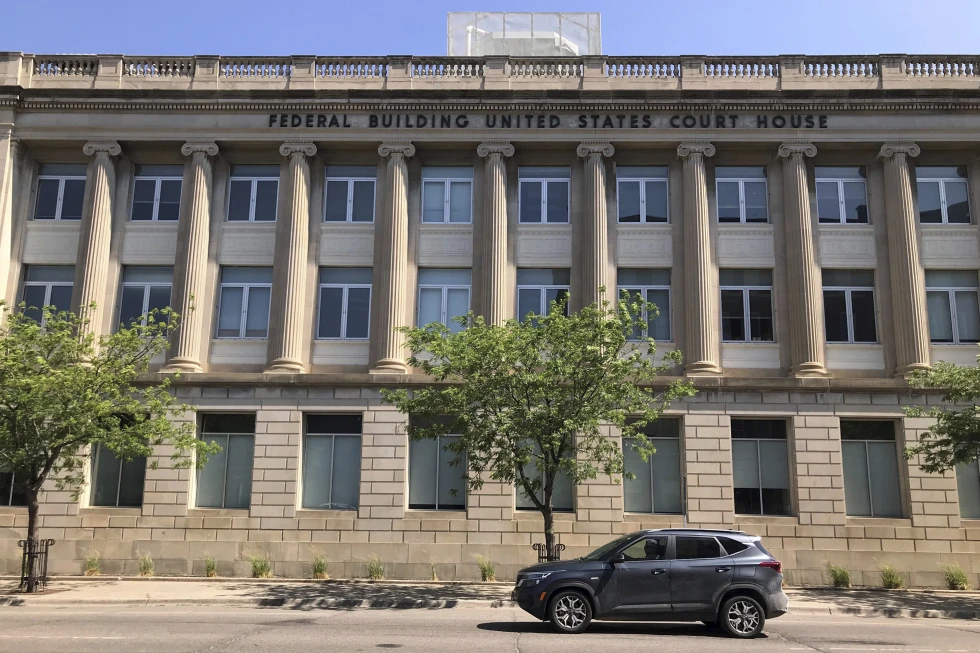
The lawsuit filed against Patriot Front in federal court on Friday alleges that the group, two of the group’s leaders and 10 others violated the Ku Klux Klan Act of 1871, which the complaint says “was designed to prevent precisely the kind of conspiratorial racist activity that Defendants perpetrated in this case.”
The lawsuit, filed by the North Dakota Human Rights Coalition, the Immigrant Development Center and the center’s executive director, says Patriot Front also posted “anti-immigrant propaganda” days after a man of Syrian descent fatally shot a Fargo police officer and wounded two others in July. The suit seeks a jury trial and damages of an amount to be determined at trial, as well as attorneys’ fees and other relief.
No attorney is listed on the case docket for Patriot Front or the other defendants. Attorney Jason Lee Van Dyke, who has represented members of Patriot Front in other cases, did not respond to a message left with his office. Attorney Robert Sargent, who recently represented group members at a criminal trial in Idaho, said he knew nothing of the lawsuits against Patriot Front.
Patriot Front “is probably one of the most active white nationalist hate groups in the U.S.,” said Rachel Carroll Rivas of the Southern Poverty Law Center, which monitors such groups but did not participate in the lawsuit.
The group emphasizes “public actions” such as posting racist flyers, holding demonstrations and engaging in public displays “meant to make people fearful,” said Carroll Rivas, deputy director for research and analysis with the center’s Intelligence Project.
The lawsuit filed Friday alleges that Patriot Front members vandalized businesses and public property in the summer and fall of 2022. It specifically cites Patriot Front logos and designs spray-painted on the International Market Plaza, an indoor market area for immigrant business owners, and defaced murals, including one depicting Black women wearing hijabs.
As a result of the vandalism, the complaint says, shopkeepers have lost customers, reduced their hours and fear for their safety.
Patriot Front’s actions “were intended to cause fear and deprive others — especially immigrants of color — of their rights, and, unfortunately, Patriot Front achieved that result,” the complaint states.
Vandalism also occurred near a Liberian-owned restaurant, in a pedestrian tunnel, and at a coffee shop and arts collective owned by LGBTQ people and people of color, according to the complaint.
Recent vandalism took place after the July 14 fatal shooting in Fargo carried out by 37-year-old Mohamad Barakat, a Syrian national who came to the U.S. in 2012 on an asylum request and became a U.S. citizen in 2019. North Dakota Attorney General Drew Wrigley said last month that Barakat’s motive remains unknown, but he appeared to be targeting police officers in what authorities have said was likely part of a larger, planned attack.
Other lawsuits in recent years have cited the Ku Klux Klan Act, including cases brought against former President Donald Trump and others in connection with the siege of the U.S. Capitol on Jan. 6, 2021.
A Black teacher and musician cited the law last month in his federal lawsuit alleging that Patriot Front members surrounded and assaulted him in a coordinated and racially motived attack last year in Boston.
The Reconstruction-era law seeks to protect the civil rights of marginalized groups of people. The statute has been cited in employment-law cases and in contract-dispute cases between corporations, and also in lawsuits alleging violence and terroristic fear since the 2017 “Unite the Right” rally in Charlottesville, Virginia, said Ayesha Bell Hardaway, professor of law at Case Western Reserve University’s School of Law and director of the school’s Social Justice Law Center.
“It’s important, I think, for us to be mindful of the fact that violence ... and terrorism related to white supremacy isn’t a relic of the past,” she told The Associated Press.
